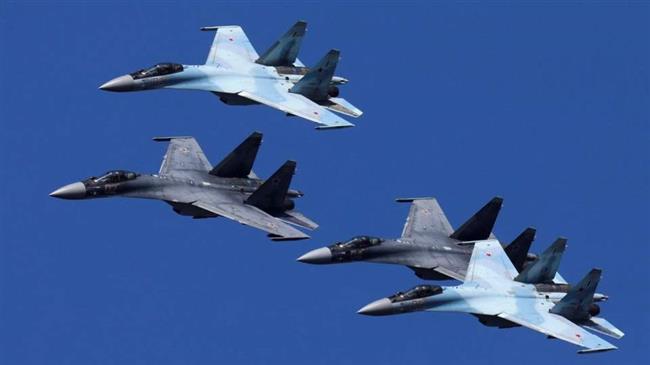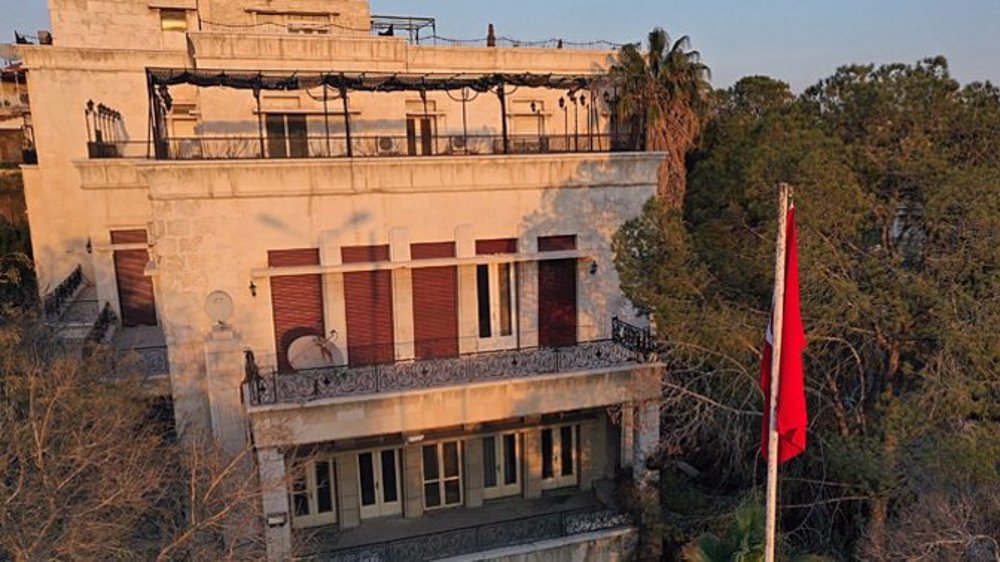Turkey in talks with Russia over buying Su-35 fighter jets: Russian official
A senior Russian official says Moscow and Ankara are holding talks about the possible sale of Russian-made Sukhoi Su-35 fighter jets to Turkey, after Washington removed Ankara from its F-35 fighter jets program after the latter received the first parts of advanced Russian S-400 missile defense system.
Director of the Federal Service for Military-Technical Cooperation Dmitry Shugaev said in an exclusive interview with Russia’s state-run RIA news agency on Friday that Su-35 model is in order of priority as the “first in a line of Russian combat aviation,” while Su-57 can be considered in the next stage.
Russia, Turkey in 'progressive' talks on Su-35 fighter jets: Russian official https://t.co/BcYbZsaJYq
— DAILY SABAH (@DailySabah) September 28, 2019
“We have a progressive interaction in this area. It is too early to talk about any contracts and say that we have started something specific, but the issue is being studied, [and] consultations are being held at the level of specialists and experts,” he noted.
Back on August 10, Turkish daily newspaper Yeni Şafak reported that the Turkish defense procurement authorities had called on the country’s military to formally consider the purchase of Su-35 jets from Russia.
Ankara would start official negotiations with the Russian state arms company Rosoboronexport if the military approved the proposal, the paper said.
Turkey's Defense Ministry announced in a statement on September 15 that the delivery of the second battery of S-400 missile defense systems has been completed at Murted Airfield Command, located 35 kilometers (22 miles) northwest of the capital Ankara, and that the systems would become operational in April 2020.
The first part of the S-400 delivery was completed in late July. Russia delivered 30 planeloads of S-400 hardware and equipment – as part of the initial batch – to Murted Airfield Command.
Ankara and Washington have been at loggerheads over Turkey's purchase of the S-400 systems, which the United States says are not compatible with NATO defenses and poses a threat to Lockheed Martin F-35 stealth fighter jets.
Turkish Foreign Minister Mevlut Cavusglu told Turkish-language CNN Turk television news network in an exclusive interview in mid-September that S-400 missile systems would be activated despite repeated US warnings.
S-400 kutuları açıldı mı? Hangi bölgelere konulacaklar? F-35'ler Türkiye'ye gelecek mi? Suriyeliler geri dönecek mi? "Kapıları açarız" ne demek? Doğu Akdeniz'de neler yaşanıyor? Dışişleri Bakanı Mevlüt Çavuşoğlu, merak edilenleri 5N1K'da anlattı https://t.co/dS5rBetrda pic.twitter.com/At0bwfZYst
— CNN TÜRK Program (@CNNTURKProgram) September 14, 2019
“They (US officials) told us 'don't activate them and we can sort this out', but we told them that we didn't buy these systems as a prop,” the top Turkish diplomat said, adding that Turkey would be open to buying US-made Patriot surface-to-air missile systems as well.
On September 9, US Treasury Secretary Steven Mnuchin said Donald Trump’s administration was considering imposing sanctions on Turkey over purchase of S-400 systems, but no decisions have been made yet.
Cavusoglu told private Turkish-language TGRT Haber television news network in an exclusive interview back on July 22 that his country would take retaliatory measures in case the United States slapped sanctions on Ankara over the Russian-made systems.
“If the United States portrays an adversarial attitude towards us, we will take retaliatory measures, as we've told them. This is not a threat or a bluff. We are not a country that will bow down to those who show an animosity towards Turkey,” he said.
Cavusoglu added that he did not expect the US administration to take such an action.
The White House said on July 17 that it was no longer possible for Turkey to be involved in the program for the F-35 stealth jets after parts of S-400 began arriving in Ankara.
It also said it would impose sanctions on Turkey under the Countering America's Adversaries Through Sanctions Act (CAATSA).
The US Congress passed the CAATSA against Russia in August 2017 over allegations of interfering in the 2016 presidential election. The law, among other things, imposes sanctions on countries and companies that engage in contracts to purchase weaponry from Russia.
Moscow and Ankara finalized an agreement on the delivery of the S-400 in December 2017.
Back in April 2018, Erdogan and his Russian counterpart Vladimir Putin said in Ankara that they had agreed to expedite the delivery of the S-400. At the time, it was said that the delivery could be made between late 2019 and early 2020.
A number of NATO member states have criticized Turkey for purchase of the S-400, arguing the missile batteries are not compatible with those of the military alliance.
They also argue that the purchase could jeopardize Ankara’s acquisition of F-35 fighter jets and possibly result in US sanctions.
The S-400 is an advanced Russian missile system designed to detect, track, and destroy planes, drones, or missiles as far as 402 kilometers away. It has previously been sold only to China and India.
Ankara is striving to boost its air defense, particularly after Washington decided in 2015 to withdraw its Patriot surface-to-air missile system from Turkish border with Syria, a move that weakened Turkey’s air defense.
Before gravitating towards Russia, the Turkish military reportedly walked out of a $3.4-billion contract for a similar Chinese system. The withdrawal took place under purported pressure from Washington.
D-8’s role in Iran’s economy after Cairo summit
China slams US as ‘war-addicted’ threat to global security
China ‘firmly opposes’ US military aid to Taiwan
VIDEO | Press TV's News Headlines
President Yoon Suk Yeol to be removed from office
At least 19 Gazans killed by Israeli airstrikes since dawn: Medics
Leader: Iran neither has nor needs proxy forces
US fighter aircraft shot down ‘in friendly fire’ amid aggression on Yemen




















 This makes it easy to access the Press TV website
This makes it easy to access the Press TV website